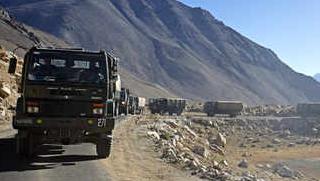Despite Bloodshed and Violence, Army Engineers Worked 72 Hours to Finish Galwan Bridge
By :
Notice: Trying to get property 'fName' of non-object in /home/u589520015/domains/observerdawn.com/public_html/module/Application/view/application/index/news.phtml on line 23
Notice: Trying to get property 'lName' of non-object in /home/u589520015/domains/observerdawn.com/public_html/module/Application/view/application/index/news.phtml on line 23

The
Indian Army went full speed ahead to finish a piece of military infrastructure
that is actually supposed to be the reason behind tensions in the Galwan Valley
of Ladakh.
The incident had left 20 Indian Army
personnel and an unspecified number of Chinese Army personnel dead. Meanwhile,
the Indian Army's combat engineers received orders to leave no stone unturned
to accelerate and finish the construction of a bridge over the Galwan River.
The 60-meter bridge, a crucial piece of connectivity that provides Indian
military units sharper access to points near the Line of Actual Control (LAC),
was finished on Thursday afternoon, with the Army testing it with vehicles over
a period of two hours. On June 18, 2020, the Army's Karu-based mountain
division sent word to the Army Engineers unit asking them to speed up with the
bridge construction without any delay.
This bailey bridge is a type of portable
bridge comprised of metal trusses for the rapid transit of military vehicles of
all kinds, including infantry combat vehicles. The concerned commanders felt
the need to issue the specific instruction since the enormity of Monday night's
events could have potentially thrown things out of gear on the ground, given the
bridge construction was taking place no more than a couple of kilometers from
where the bloodletting took place. With growing tensions in the area following
the brawl, infantry companies in the area were asked to specifically provide
cover as the engineers finished the bridge. However, the work was till June 17,
2020 night and the very next day night in freezing temperatures.
Major General, Abhijit Bapat, the Indian Army divisional commander, who arrived at Patrol Point 14 on the morning of June 16 for talks with his Chinese counterpart, received a specific brief on progress of the bridge. The focus of the talks remained on disengaging and de-escalation after the bloodshed, though the instructions to the Army engineers were clear that the work was not to stop at any cost. The bridge, one of two chief Indian infrastructural trigger points for Chinese mobilizations in the Galwan Valley is now complete and fully operational. Earlier this week that the Border Roads Organization, which works in tandem with Army engineers in these areas, was speeding up construction over the larger Shyok River not far from the Galwan-Shyok confluence.
